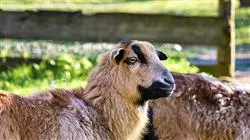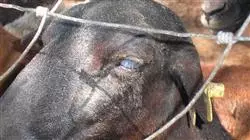University certificate
The world's largest faculty of veterinary medicine”
Introduction to the Program
The approach to neurological and ophthalmic diseases in ruminants, with all the specific developments that field work brings with it, in a Postgraduate certificate focused on real practice"

Neurological diseases are frequent in ruminants. This Postgraduate certificate provides students with the necessary tools to identify the main neurological pathologies in cattle and small ruminants. Ruminants can develop neurological diseases, which if unknown are virtually impossible to diagnose.
First, it will be explained how to perform a neurological examination and how to locate a neurological lesion in cattle. Next, the main pathologies affecting cattle will be studied, divided by anatomical regions: brain, brainstem, cerebellum, spinal cord and peripheral nerves. Finally, how to perform the neurological examination will be discussed and the main neurological pathologies affecting small ruminants will be detailed.
Some neurological diseases are very important and even have public health implications as they can be zoonotic, such as rabies, listeriosis or spongiform encephalopathies. This module provides the knowledge to establish a diagnosis and to be able to treat and prevent these diseases.
Additionally, this module deals with ocular disorders affecting cattle and small ruminants. Some diseases have a significant impact on these animals, even influencing their productive performance on the farm, such as infectious keratoconjunctivitis. In-depth knowledge of these alterations in order to diagnose, treat and prevent them is fundamental for the clinical veterinarian.
Essential yet rare specialization for the specialized veterinary clinician that will set you apart as a specialist in this field of work"
This Postgraduate certificate in Neurological and Ophthalmological Diseases in Ruminants contains the most complete and up-to-date scientific program on the market. The most important features include:
- The latest technology in Online teaching software
- A highly visual teaching system, supported by graphic and schematic contents that are easy to assimilate and understand
- Practical cases presented by practising experts
- State-of-the-art interactive video systems
- Teaching supported by telepractice
- Continuous updating and recycling systems
- Autonomous learning: full compatibility with other occupations
- Practical exercises for self-assessment and learning verification
- Support groups and educational synergies: questions to the expert, debate and knowledge forums
- Communication with the teacher and individual reflection work
- Content that is accessible from any fixed or portable device with an Internet connection
- Complementary documentation banks permanently available, even after the course
The clinical, specialized and advanced fundamentals, based on veterinary evidence, that will allow you to face the daily intervention in cattle and ruminants”
Our teaching staff is made up of professionals from different fields related to this specialty. In this way, TECH makes sure to offer professionals the up-to-date objective it intends. A multidisciplinary team of professionals trained and experienced in different environments will develop the theoretical knowledge efficiently, but, above all, they will provide students with the practical knowledge derived from their teaching experience: one of the differential qualities of this training.
This mastery of the subject matter is complemented by the effectiveness of the methodological design. Developed by a multidisciplinary team of e-Learning experts, it integrates the latest advances in educational technology. In this way, the students will be able to study with comfortable and versatile multimedia tools that will give them the operability they need in their training.
The design of this program is based on Problem-Based Learning: an approach that conceives learning as a highly practical process. To achieve this remotely telepractice will be used: with the help of an innovative system of interactive videos and learning from an expert they will be able to acquire the knowledge as if they were facing the case they are learning at that moment. A concept that will make it possible to integrate and fix learning in a more realistic and permanent way.
With a methodological design based on proven teaching techniques, this innovative program will take you through different teaching approaches to allow you to learn in a dynamic and effective way"

Supported by evidence, the approach of this program will allow you to learn in a contextual way and acquire the skills you will really need in your daily practice"
Why study at TECH?
TECH is the world’s largest online university. With an impressive catalog of more than 14,000 university programs available in 11 languages, it is positioned as a leader in employability, with a 99% job placement rate. In addition, it relies on an enormous faculty of more than 6,000 professors of the highest international renown.

Study at the world's largest online university and guarantee your professional success. The future starts at TECH”
The world’s best online university according to FORBES
The prestigious Forbes magazine, specialized in business and finance, has highlighted TECH as “the world's best online university” This is what they have recently stated in an article in their digital edition in which they echo the success story of this institution, “thanks to the academic offer it provides, the selection of its teaching staff, and an innovative learning method aimed at educating the professionals of the future”
A revolutionary study method, a cutting-edge faculty and a practical focus: the key to TECH's success.
The most complete study plans on the university scene
TECH offers the most complete study plans on the university scene, with syllabuses that cover fundamental concepts and, at the same time, the main scientific advances in their specific scientific areas. In addition, these programs are continuously being updated to guarantee students the academic vanguard and the most in-demand professional skills. In this way, the university's qualifications provide its graduates with a significant advantage to propel their careers to success.
TECH offers the most comprehensive and intensive study plans on the current university scene.
A world-class teaching staff
TECH's teaching staff is made up of more than 6,000 professors with the highest international recognition. Professors, researchers and top executives of multinational companies, including Isaiah Covington, performance coach of the Boston Celtics; Magda Romanska, principal investigator at Harvard MetaLAB; Ignacio Wistumba, chairman of the department of translational molecular pathology at MD Anderson Cancer Center; and D.W. Pine, creative director of TIME magazine, among others.
Internationally renowned experts, specialized in different branches of Health, Technology, Communication and Business, form part of the TECH faculty.
A unique learning method
TECH is the first university to use Relearning in all its programs. It is the best online learning methodology, accredited with international teaching quality certifications, provided by prestigious educational agencies. In addition, this disruptive educational model is complemented with the “Case Method”, thereby setting up a unique online teaching strategy. Innovative teaching resources are also implemented, including detailed videos, infographics and interactive summaries.
TECH combines Relearning and the Case Method in all its university programs to guarantee excellent theoretical and practical learning, studying whenever and wherever you want.
The world's largest online university
TECH is the world’s largest online university. We are the largest educational institution, with the best and widest online educational catalog, one hundred percent online and covering the vast majority of areas of knowledge. We offer a large selection of our own degrees and accredited online undergraduate and postgraduate degrees. In total, more than 14,000 university degrees, in eleven different languages, make us the largest educational largest in the world.
TECH has the world's most extensive catalog of academic and official programs, available in more than 11 languages.
Google Premier Partner
The American technology giant has awarded TECH the Google Google Premier Partner badge. This award, which is only available to 3% of the world's companies, highlights the efficient, flexible and tailored experience that this university provides to students. The recognition as a Google Premier Partner not only accredits the maximum rigor, performance and investment in TECH's digital infrastructures, but also places this university as one of the world's leading technology companies.
Google has positioned TECH in the top 3% of the world's most important technology companies by awarding it its Google Premier Partner badge.
The official online university of the NBA
TECH is the official online university of the NBA. Thanks to our agreement with the biggest league in basketball, we offer our students exclusive university programs, as well as a wide variety of educational resources focused on the business of the league and other areas of the sports industry. Each program is made up of a uniquely designed syllabus and features exceptional guest hosts: professionals with a distinguished sports background who will offer their expertise on the most relevant topics.
TECH has been selected by the NBA, the world's top basketball league, as its official online university.
The top-rated university by its students
Students have positioned TECH as the world's top-rated university on the main review websites, with a highest rating of 4.9 out of 5, obtained from more than 1,000 reviews. These results consolidate TECH as the benchmark university institution at an international level, reflecting the excellence and positive impact of its educational model.” reflecting the excellence and positive impact of its educational model.”
TECH is the world’s top-rated university by its students.
Leaders in employability
TECH has managed to become the leading university in employability. 99% of its students obtain jobs in the academic field they have studied, within one year of completing any of the university's programs. A similar number achieve immediate career enhancement. All this thanks to a study methodology that bases its effectiveness on the acquisition of practical skills, which are absolutely necessary for professional development.
99% of TECH graduates find a job within a year of completing their studies.
Postgraduate Certificate in Neurological and Ophthalmological Diseases in Ruminants
.
At TECH Global University, we present the Postgraduate Certificate in Neurological and Ophthalmological Diseases in Ruminants, a unique opportunity to acquire specialized knowledge in the veterinary field and expand your skills in the diagnosis and treatment of nervous and ocular diseases in ruminants. Our online classes will give you the flexibility to study from anywhere and make the most of your time. Ruminant health care is of vital importance to ensure the well-being and performance of ruminants. With our academic program, you will be able to study in depth the neurological and ophthalmological diseases that affect these animals, understanding their origin, diagnosis and the best therapeutic strategies currently available. At TECH Global University, we understand the importance of flexibility and accessibility in education. Our online classes will allow you to access the Postgraduate Certificate content at any time and from any device. You will be able to learn at your own pace, adapting your study schedule to your responsibilities and making the most of the advantages of distance education.
Study an excellent online veterinary Postgraduate Certificate
.
Our teaching team is composed of veterinary experts with extensive experience in the field of neurological and ophthalmological diseases in ruminants. Through interactive resources, case studies and state-of-the-art tools, you will receive comprehensive training that will enable you to effectively identify and address diseases affecting the nervous system and eyes of ruminants. Upon completion of the Postgraduate Certificate, you will be prepared to meet the challenges of diagnosing and treating neurological and ophthalmologic diseases in ruminants. You will be able to apply advanced diagnostic techniques, interpret specialized tests and design effective treatment plans to improve the health and welfare of these animals. Don't miss the opportunity to enhance your career in the veterinary field and become a highly skilled professional in addressing neurological and ophthalmologic diseases in ruminants. Enroll today at TECH.







